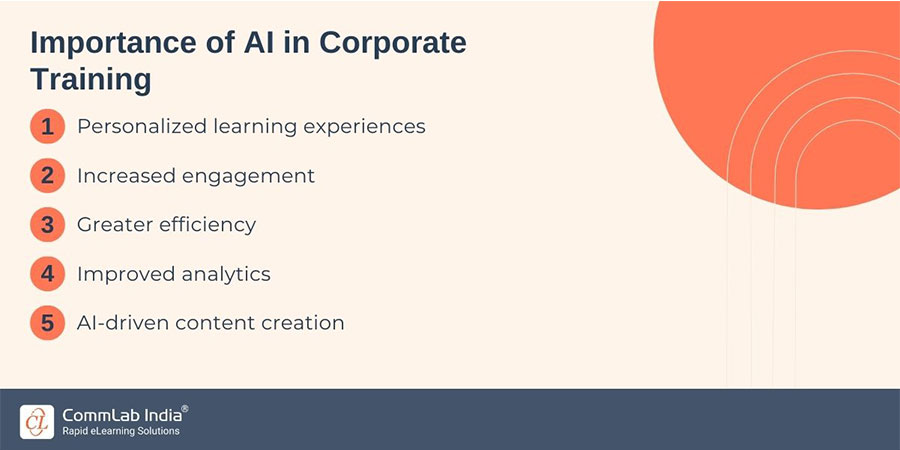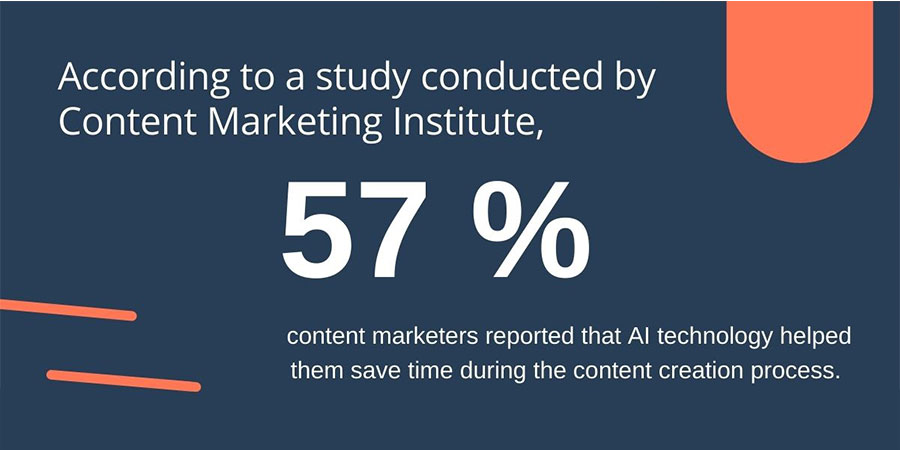6 Critical Roles of AI in Revolutionizing Corporate Training

We live in a dynamic corporate training landscape where technological advancements are reshaping traditional methods. Artificial Intelligence (AI) is one such groundbreaking technological advancement that is rapidly transforming how organizations approach learning and development. Want to know how? Read on as we discuss the remarkable ways AI is revolutionizing corporate training...
AI and Corporate Training: A Perfect Synergy
AI in corporate training facilitates:
- Personalized Learning Paths: AI tailors content for engaged, retained learners.
- Immersive Interactivity: AI-enhanced VR/AR boosts dynamic participation.
- Actionable Data Insights: AI refines strategies for optimal training.
AI in Corporate Training
Artificial intelligence (AI) involves the use of advanced computers and technology to carry out tasks that would normally require human intelligence, such as understanding natural language and recognizing objects. Recent times have witnessed heightened use of AI across industries redefining the way they operate and interact.
The corporate training industry, among other industries, has harnessed AI to streamline operations and make them more effective. Since the rise of AI, learning and development experiences are evolving into dynamic, personalized journeys. And to leverage this, organizations are adopting AI-driven technologies and tools to develop corporate training content, adapt to learners' preferences, and ensure that their individual strengths and weaknesses are addressed.
Let us now understand why AI is important in corporate learning and development:
Importance of AI in Corporate Training

1. Personalized learning experiences: AI can be used to create personalized learning experiences for each learner. By taking into account factors such as learning style, preferences, and their previous knowledge, AI can create a customized learning experience that is tailored specifically for the individual.
2. Increased engagement: One of the biggest challenges in corporate training is getting employees to actually engage with the material. However, by using AI-powered chatbots or virtual assistants, you can increase engagement by providing learners with an interactive experience that simulates a real-life conversation.
Explore how AI videos help boost learner engagement
3. Greater efficiency: Another benefit of using AI in corporate training is increased efficiency. By automating repetitive tasks such as grading quizzes or providing feedback, you can free up your time so that you can focus on more important tasks. In addition, AI can also be used to create adaptive content that adjusts itself to the learner’s progress and abilities, making learning more efficient.
4. Improved analytics: AI can also be used to track learner performance in real-time, providing you with insights into their progress as well as areas of improvement. This data can then be used to make informed decisions about how best to adjust your training program for maximum impact.
5. AI-driven content creation: AI's content creation prowess transforms online training course development. From interactive modules to video scripts, AI expedites content creation, freeing trainers to focus on strategic aspects of learning. Additionally, AI is also revolutionizing eLearning translations with speed, accuracy, and cost-efficiency.
→ Access Now: Implications of ChatGPT and Other Rapid eLearning Accelerators [Webinar Recording]
Now that we have a fair idea of AI’s importance in corporate training, let us understand the role that this technological innovation plays in corporate learning and development:
6 Critical Roles of AI in Corporate Training
1. Bridging Knowledge Gaps
One way AI can be helpful is by identifying individual knowledge gaps in corporate training. Traditionally, corporate training assumes that all employees have the same level of knowledge. However, AI can efficiently assess the skills of each employee.
For example, let's say a large organization is introducing a new software system. AI can quickly determine which employees are already familiar with similar tools, and which ones require more comprehensive training. This saves time and resources for the organization.
2. Smart Content Recommendations
AI simplifies the process of finding relevant resources. AI recommends the learners with relevant resources (based on specific parameters) so they do not have to go searching through extensive content libraries. For instance, if a sales representative wants to improve their negotiation skills, AI can suggest a tailored selection of resources such as video series, articles, and simulations that are specifically designed for their role. This not only increases engagement but also improves the efficiency of learning.
3. Effortless Content Creation
AI can significantly simplify content creation and save valuable time for trainers. Imagine that you are tasked to create a training module on cybersecurity. You can deploy AI to pull all the relevant information from genuine sources, and compile a concrete module that’s appropriate for your learners. You can also follow the same approach to generate quizzes and polls for eLearning assessment, allowing you to focus on quality rather than quantity.

This statistic further supports the notion that AI can streamline content creation and allow trainers to allocate more time and effort towards developing high-quality training materials.
4. Personalized Learning Journeys
AI understands this and can adapt training content based on the learner's unique learning style and pace. For instance, if a finance employee is taking a course on risk management, the AI could recognize their expertise and provide them with advanced modules, while a beginner might receive foundational content.
5. 24/7 Digital Tutor
Learning experiences often come across doubts during their learning journeys. While traditional learning experiences often have limitations with respect to the tutor’s availability for doubt clarifications, AI chatbots can address them 24/7.
Imagine an employee undergoing a project management course and having questions about agile methodologies. An AI chatbot could provide instant explanations, clarifying concepts and supporting continuous learning.
6. Instant Assessments and Personalized Feedback
Traditional tests might not suit all learners' abilities. AI assessments can be tailored based on a learner's skill level. For instance, an AI assessment for a coding course could adapt to a novice's pace while offering more challenging questions to an experienced programmer.
Wrapping Up
AI is revolutionizing the corporate training industry, offering companies a variety of ways to improve and streamline their processes. By using AI for automating mundane tasks, personalizing learning experiences, analyzing employee performance in real-time, and creating interactive virtual classrooms, businesses can create an effective learning environment that helps employees develop their skills efficiently. Ultimately, AI is helping companies accelerate their eLearning development while also enhancing the quality of their training programs.
Want to know more about AI and other rapid eLearning accelerators? This webinar will take you through it! Access the recording now!





